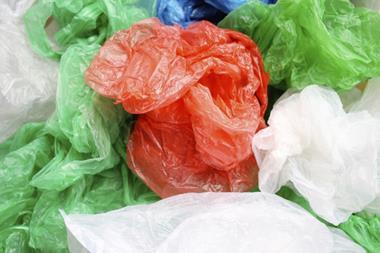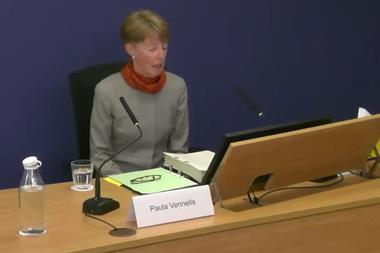It’s compulsory to charge a levy for plastic bags in Wales, but stores around the UK are following suit voluntarily as they realise its benefit
When national papers campaign on an issue, you know it has entered mainstream consciousness. Such is the case when the Daily Mail pushed to ban the environmental scourge that is plastic bags in 2008.
Influential or not, there was clearly an appetite for a curb on plastic bag use and, while Westminster dithered, Wales took the initiative in 2011 when it introduced a 5p levy on plastic bags for all shops, with the proceeds directed to charities of the retailers’ choice.
Northern Ireland followed in April 2013 — although the proceeds end up with the Department of the Environment — and in June this year Scotland announced a similar model to that in Wales, to be introduced in October 2014.
Just when it seemed England would ignore the trend, deputy prime minister Nick Clegg announced in September that English retailers would be required to introduce a levy after all. The 5p charge will be applied by autumn 2015 and charities will be the likely beneficiaries. However, ministers have exempted small retailers — those with under 250 employees — from the levy. The decision has bemused the trade — after all, no one had asked for the exemption, says Association of Convenience Stores public affairs director Shane Brennan.
Many small stores in England are weighing up whether they should push on anyway, regardless of legislation. A look at how Welsh retailers have fared so far should help them make up their minds. For Conrad Davies, who owns four Spar stores in North Wales, the issue is a no- brainer. In one store alone plastic bag consumption has dropped from about 7,000 to less than 1,000, saving him about £15,000 a year.
To prove his success is not isolated, official statistics from the Waste & Resources Action Programme (Wrap) show that plastic bag usage fell by 76% - a similar proportion - in Welsh supermarkets last year.
“It’s saving us a fortune and has enabled us to do more charity work with the proceeds of the levy,” Conrad says. Furthermore, Conrad had no negative customer reaction when rolling out the scheme as it had been so well publicised. His advice to English retailers is simple. “Just get on with it! It’s nonsense that small stores will be exempt in England; it’ll just confuse shoppers if they’re not charging when supermarkets are. People expect it now anyway.”
Chris Ward, who owns a Eurospar in Milford Haven, Pembrokeshire, is similarly upbeat about the levy. Plastic bag usage has been slashed from 1,700-2,000 to 800-1,000 a week, saving him about £10 a week on average. “It hasn’t had a negative impact on business in any shape or form,” he says. “It’s been nothing but positive and good PR for us.” The good PR is generated by the money that he is able to give to good causes: more than £1,800 this year.
As it is retailers’ decision how to allocate the proceeds, Chris has opted to donate to two charities at a time every three months. Each receives about £300. So far he has donated to PATCH (Pembrokeshire Action to Combat Hardship), Air Ambulance in West Wales, a school for disabled children, a Christmas lunch for pensioners, and an animal rescue centre. “It’s great to be able to contribute like this, and by giving to two charities at a time it’s a double whammy for PR,” he adds.
Chris promotes the charity work on Twitter and Facebook, while the charities will mention it on their websites, too. “We ran an advertorial in the local paper talking about our contribution, but in future I’ll contact the local press more to promote it,” he says.
Conrad donated to a local youth centre on the North West Welsh coast for the first two years of the scheme, on the condition they used the annual £2,000 for environmental projects. This year he’s planning to donate to the mountain rescue team, given his Dolgellau and Blaenau stores are in Snowdonia. “We’ll do a photo shoot with them and send the pictures to the local press, as we did with the youth club work,” he says.
Some retailers in England have been reducing bag usage without waiting for any legislation. Knight’s Budgens of Hassocks, West Sussex, is raising money for local causes from plastic bags without charging a levy. Under the Pennies for Plastic initiative, 1p is donated to the local primary school every time a customer reuses their own carrier bag and doesn’t use a new bag. The school receives about £400 a year, meaning customers reuse about 40,000 bags annually. “I have been pleasantly surprised at how quickly the campaign took off and has been supported by our customers. Reducing our impact on the environment is at the forefront of everything we do in our store and we are always looking for ways to do our bit to reduce our carbon footprint,” says store owner David Knight. “Pennies for Plastic allows us to do this and support the local community at the same time. It’s the perfect win-win for us.”
Till staff encourage customers to use alternatives to plastic bags by asking if they have their own bag, while ‘bags for life’ are also on sale. David says he would introduce a levy alongside supermarkets when the English legislation is introduced, so as not to appear out of step with the multiples. “Lots of customers want us to do it, but we’ve held back so we don’t alienate those who didn’t agree.”
Clive Sheppard, director of Chartman Group, which owns a chain of Spar forecourts in Devon and Cornwall, introduced a 10p levy six months ago to “universal” customer acceptance. “I feared it would alienate customers at first, but it hasn’t’; they completely understand,” he says.
“It’s given us significant savings and is helping the environment.” Clive also sells re-usable bags, but they haven’t really taken off as people usually bring their own. At the moment, he doesn’t donate the proceeds to local charities, but is planning to do so soon. “It’s crazy that the government has excluded us from the proposals,” he adds. “The public have generally accepted charging now. The turning point was when M&S started doing it around here.”
In Scotland, Nisa retailer Sid Ali introduced a 5p bag levy a few years ago at his Mintlaw, Aberdeenshire, store. “It had a great effect. It reduced plastic bag use by 90% and we gave the proceeds to local primary schools,” he says. So why did he then abort the scheme? His answer speaks volumes about the merits of blanket legislation. “All the shops in the village initially agreed to charge for bags, but then a new owner took over the Costcutter and stopped charging, so we had to compete and stopped, too. The Co-op carried on charging 5p so we wanted a USP over them.”
However, he is about to reintroduce a 3p charge ahead of the compulsory levy next year. “We’ll sit in the middle in the meantime and can tell people we donate the money to charity, whereas I think the Co-op’s proceeds go to a central pot.” When the 5p levy comes into force people will be used to it, he argues.
“I welcome the legislation in Scotland - anything which helps the environment is fantastic. It’ll create a level playing field; it’s harder when it’s voluntary,” he adds. “The UK government needs to see the light and make it a blanket charge if they want to stop people using plastic bags. Doing something for just one size of retailer causes confusion.”
But not all retailers are convinced by a compulsory levy. Mike Skerrett, owner of an 800sq ft Spar store in Dolwyddelan, North Wales, says it is harder to reduce plastic bag usage in smaller stores. “The problem with a c-store is that people come in on impulse so don’t think about bringing a bag,” he says. “And when the English come along they don’t want to pay for one as they’re not used to it.” Even so, he says bag usage has reduced by about 70% since the levy.
Mike donates the proceeds - about £50 every six months - to a local primary school. “But by the time I’ve done the paperwork it would have been easier to send them a cheque of £50 off my own back!”
England’s bag use continues to rise

The effectiveness of the Welsh plastic bag levy can be seen in the results of a recent survey showing the disparity between usage in England and Wales.
Figures from Wrap show that the number of single-use carrier bags used by supermarket customers in Wales fell by 76% to 70 million in 2012, the first full year of the levy. By contrast, in England bag usage rose by 4.4% to more than seven billion in the same period.
In Scotland - where a 5p will levy will come into force next year - the figure rose by 1.1% to 750 million. Usage in Northern Ireland rose by 3% to 190 million, but the figures pre-date the 5p levy which came into force in 2013.
The European Commission this month proposed a directive which would require member states to charge, set targets or even ban plastic bags. It believes the measures could reduce usage by 80% across the EU.
























No comments yet